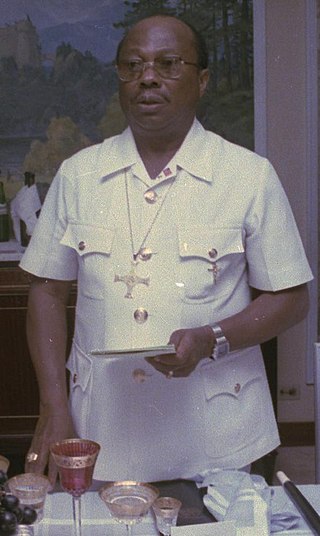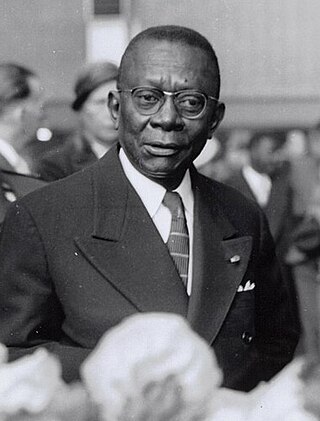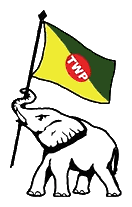
The Politics of Liberia takes place in a framework of a presidential representative democratic republic modeled on the government of the United States, whereby the president is the head of state and head of government; unlike the United States, however, Liberia is a unitary state as opposed to a federation and has a pluriform multi-party system rather than the two-party system that characterizes US politics. Executive power is exercised by the government. Legislative power is vested in both the government and the two chambers of the legislature.

The president of the Republic of Liberia is the head of state and government of Liberia. The president serves as the leader of the executive branch and as commander-in-chief of the Armed Forces of Liberia.

William Richard Tolbert Jr. was a Liberian politician who served as the 20th president of Liberia from 1971 until his assassination in 1980.

William Vacanarat Shadrach Tubman was a Liberian politician. He was the 19th president of Liberia and the longest-serving president in the country's history, serving from his election in 1944 until his death in 1971.

The True Whig Party (TWP), also known as the Liberian Whig Party (LWP), is the oldest political party in Liberia and Africa as a whole. Founded in 1869 by primarily darker-skinned Americo-Liberians in rural areas, its historic rival was the Republican Party. Following the decline of the latter, it dominated Liberian politics from 1878 until 1980. The nation was virtually governed as a one-party state under the TWP, although opposition parties were never outlawed.

The People's Redemption Council (PRC) was a military junta that ruled Liberia from 1980 to 1984. It was established after the 1980 Liberian coup d'état wherein Samuel Doe seized power on 12 April 1980. The Council, with Doe as its chairman, promised a complete overhaul of Liberia's society, economy, and political system and the replacement of the corruption of previous regimes with respect for the rights of the Liberian people. The PRC had 17 founding members and was later expanded to 28. The PRC initially functioned as the executive and legislative body in Doe's government. However, over time Doe consolidated power as a central executive. In 1984, the PRC was dissolved and replaced by the Interim National Assembly.

General elections were held in Liberia on 11 October 2005, with a runoff election for the presidency held on 8 November. The presidency and all seats in the House of Representatives and Senate were up for election. The elections were the first held since 1997 and marked the end of the political transition following the second civil war, having been stipulated in the Accra Comprehensive Peace Agreement of 2003. Ellen Johnson Sirleaf, former World Bank employee and Liberian finance minister, won the presidential contest and became the first democratically elected female African head of state in January 2006.

General elections were held in Liberia on 15 October 1985. They were the first elections since the 12 April 1980 military coup that brought Samuel Doe to power. During 1984, a new draft constitutional was approved in a referendum, which provided for a 58-member civilian and military Interim National Assembly, headed by Samuel Doe as president. After a ban on political parties was lifted, four parties – Doe's National Democratic Party (NDP), the Liberian Action Party, the Unity Party and the Liberia Unification Party – contested the elections.

The Legislature of Liberia is the bicameral legislature of the government of Liberia. It consists of a Senate – the upper house, and a House of Representatives – the lower house, modeled after the United States Congress. Sessions are held at the Capitol Building in Monrovia. Legislature of Liberia is considered one of the three branches of government based on the Article III of the Constitution of Liberia that stipulates all three branches ought to be equal and coordinated based on the Principle of checks and balances.

The Senate is the upper house of the bicameral legislative branch of Liberia, and together with the House of Representatives comprises the Legislature of Liberia. Each of the fifteen counties are equally represented by two senators, elected to serve staggered nine-year terms. The Senate meets at the Capitol Building in Monrovia.

The vice president of the Republic of Liberia is the second-highest executive official in Liberia, and one of only two elected executive offices along with the president. The vice president is elected on the same ticket with the president to a six-year term. In the event of the death, resignation or removal of the president, the vice president ascends to the presidency, and holds the position for the remainder of their predecessor's term. The vice president also serves as the president of the Senate and may cast a vote in the event of a tie. The current vice president is Jeremiah Koung, serving under president Joseph Boakai. He began his term on January 22, 2024.

The Constitution of Liberia is the supreme law of the Republic of Liberia. The current constitution, which came into force on 6 January 1986, replaced the Liberian Constitution of 1847, which had been in force since the independence of Liberia. Much like the 1847 Constitution, the Constitution creates a system of government heavily modeled on the Federal Government of the United States.

General elections were held in Liberia on 11 October 2011, with a second round of the presidential election on 8 November. The presidency, as well as all seats in the House of Representatives and half of the seats in the Senate, were up for election. The election was overseen by the National Elections Commission (NEC).

A referendum to amend the Constitution of Liberia was held on 23 August 2011. Voters chose whether to ratify four amendments regarding judge tenure, elections scheduling, presidential candidate requirements and the electoral system. The National Elections Commission of Liberia (NEC) oversaw the referendum.

General elections were held in Liberia in May 1871.

General elections were held in Liberia on 7 October 1975, alongside a simultaneous referendum on presidential term limits. In the presidential election, incumbent William Tolbert of the True Whig Party was the only candidate, and was re-elected unopposed. In the legislative elections True Whig Party candidates won all 74 seats in the House of Representatives unopposed. Voter turnout was around 80%.
Frank Emmanuel Tolbert was a Liberian politician and brother of President William R. Tolbert, Jr. The oldest son of William R. Tolbert Sr., national chairman of the ruling True Whig Party, he grew up in Bensonville, attended Zion Praise Baptist Church, graduated from Liberia College, and became involved in politics relatively early in life. As his family became more and more closely connected to the family of Supreme Court Justice William V.S. Tubman, Frank began to become prominent: when Tubman ran for President in 1943, he was rumoured to be Tubman's first choice for Vice President, although his younger brother William was eventually chosen, perhaps because of Frank's unpredictable moods and violent temper.

General elections were held in Zambia on 11 August 2016 to elect the President and National Assembly. A constitutional referendum was held alongside the elections, with proposals to amend the bill of rights and Article 79.

Americo-Liberian people, are a Liberian ethnic group of African American, Afro-Caribbean, and liberated African origin. Americo-Liberians trace their ancestry to free-born and formerly enslaved African Americans who emigrated in the 19th century to become the founders of the state of Liberia. They identified themselves as Americo-Liberians.

A constitutional referendum was held in Liberia on 8 December 2020 alongside Senate elections and two by-elections to the House of Representatives. It had been planned for 13 October, but was postponed due to the COVID-19 pandemic. Voters were asked whether they approved of eight amendments to the constitution, voting separately on each one. Although a majority of valid votes were in favour of each proposal, the two-thirds quorum was not met for any proposal.













